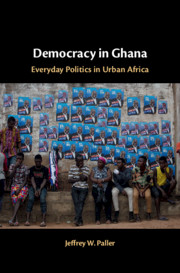Book contents
- Democracy in Ghana
- Democracy in Ghana
- Copyright page
- Dedication
- Contents
- Figures
- Tables
- Preface
- Acknowledgments
- 1 Democracy, Development, and Daily Life
- Part I The Roots of Urban Politics in Africa
- Part II Everyday Politics in Urban Ghana
- 4 The Construction of Legitimate Authority
- 5 Distributive Politics for an Urbanizing Continent
- 6 The Organization of Civic Life
- 7 Everyday Politics in Urban Africa
- Methodological Appendix
- References
- Index
4 - The Construction of Legitimate Authority
from Part II - Everyday Politics in Urban Ghana
Published online by Cambridge University Press: 18 February 2019
- Democracy in Ghana
- Democracy in Ghana
- Copyright page
- Dedication
- Contents
- Figures
- Tables
- Preface
- Acknowledgments
- 1 Democracy, Development, and Daily Life
- Part I The Roots of Urban Politics in Africa
- Part II Everyday Politics in Urban Ghana
- 4 The Construction of Legitimate Authority
- 5 Distributive Politics for an Urbanizing Continent
- 6 The Organization of Civic Life
- 7 Everyday Politics in Urban Africa
- Methodological Appendix
- References
- Index
Summary
- Type
- Chapter
- Information
- Democracy in GhanaEveryday Politics in Urban Africa, pp. 119 - 156Publisher: Cambridge University PressPrint publication year: 2019

